Most Black Americans identify as Protestant. And unlike Black Americans in other faith traditions, the majority of Black Protestant churchgoers attend religious services at a house of worship where both the leadership and most other congregants are Black.
Defining Black congregations
To help analyze survey data, this report splits Black Protestants’ places of worship into three categories – (1) Black congregations, (2) White or other race congregations, (3) and multiracial congregations – based on the respondent’s description of their congregation and clergy.
Black churches/congregations are those where the respondent said that all or most attendees are Black and the senior religious leaders are Black.
White or other race churches/
congregations are those where the respondent said that most attendees are White, most are Asian, most are Hispanic, or most are of a different (non-Black) race, AND most or all of the senior religious leaders are of the same non-Black race as one another.
Multiracial churches/congregations are primarily those where the respondent said that no single race makes up a majority of attendees. This category also includes smaller numbers of congregations where the majority of the congregation is not Black, but senior religious leader(s) are Black; congregations where all or most attendees are Black, but the senior religious leaders are not; and congregations where the senior religious leadership is multiracial, regardless of the race of the congregation.
Black Protestant churches are distinctive from other types of congregations (such as Protestant churches where the leadership and membership are mostly or exclusively White or some other race, Catholic churches and congregations in other faiths) in a variety of ways beyond their racial makeup. These include their style of worship, the topics discussed by clergy and the length of religious services. This is true both for Black Americans who attend churches associated with historically Black Protestant denominations and those who attend other predominantly Black churches.
In small-group discussions that were conducted as part of this study, Black Americans suggest that these distinctive characteristics may be more important than the churches’ racial makeup itself for explaining the continued appeal of these congregations. (For more on these small-group discussions, see Chapter 1.)
That said, younger Black adults are much less engaged in Black churches than are older generations. Millennials and members of Generation Z are more likely to be religiously unaffiliated, and they are less likely than those in older cohorts to have grown up attending a Black church. And even young adults who do attend religious services are less likely to do so at a Black church than are older Black Americans.
Most Black Protestants attend Black churches
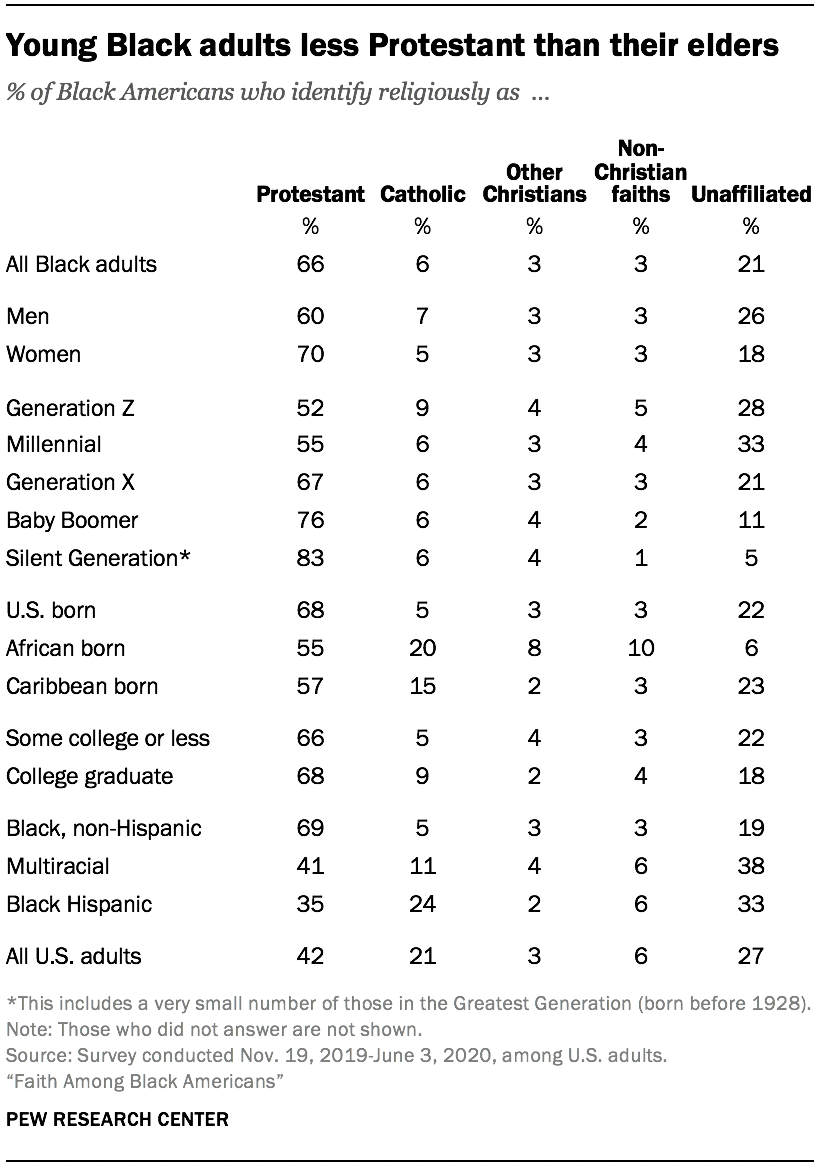 Among Black Americans, Protestant Christianity is by far the most common religious affiliation. Fully two-thirds of all Black adults (66%) describe themselves as Protestant. Catholics, the next largest religious group, account for only about 6% of all Black adults.
Among Black Americans, Protestant Christianity is by far the most common religious affiliation. Fully two-thirds of all Black adults (66%) describe themselves as Protestant. Catholics, the next largest religious group, account for only about 6% of all Black adults.
Members of other Christian faiths account for about 3% of all Black Americans. The largest of these by far is Jehovah’s Witnesses, although this category also includes Orthodox Christians, members of the Church of Jesus Christ of Latter-day Saints (also known as Mormons) and other groups.
Members of non-Christian faiths account for an additional 3% of Black adults. Muslims are the largest non-Christian religious group among Black Americans, though this category also includes some people who describe themselves as “spiritual but not religious,” as well as smaller numbers from other religious groups (such as Buddhists or adherents of traditional African or Afro-Caribbean religions).
Finally, about one-in-five Black adults (21%) are not affiliated with any religion, describing themselves as atheist, agnostic or “nothing in particular.” The vast majority of religiously unaffiliated Black Americans (18% of all Black adults) say they have no particular religion; just 3% of Black adults identify as atheist or agnostic.
The survey did not reach enough Black Christians from non-Protestant or non-Catholic groups (such as Jehovah’s Witnesses) or from non-Christian groups (such as Muslims) to allow for separate analysis of their opinions.9 These respondents are instead collectively analyzed as “other Christians” and “non-Christian faiths,” respectively. And atheists and agnostics are analyzed throughout this report as a single group, because the survey did not interview enough individuals who identify as such to analyze them separately.
Black adults are more likely than U.S. adults overall to be Protestant and less likely to be Catholic or religiously unaffiliated. Previous research suggests that Black Americans are somewhat more likely to be Jehovah’s Witnesses or Muslims than the public overall.
But the survey finds that younger Black adults are much less likely to be Protestant than older generations. Only about half of adults in Generation Z (those born after 1996) identify as Protestant, compared with three-quarters of Baby Boomers. And younger Black adults are more likely than older cohorts to be religiously unaffiliated.
The survey also finds that U.S.-born Black Americans are more likely to be Protestant than are Black immigrants, who identify as Catholic at higher rates. And immigrants from Africa are more likely than Black adults born in the U.S. to identify with other Christian groups and non-Christian faiths, while relatively few immigrants from Africa say they are religiously unaffiliated (6%).
In addition to the 3% of Black Americans who identify with non-Christian religions, there are some who say that, aside from religion, they feel a tie to these faiths – for example ethnically, culturally or because of their family’s background. Because more Black Americans identify with Islam than with any other non-Christian faith, the survey asked non-Muslim respondents if they consider themselves Muslim “aside from religion.” About as many Black Americans said they consider themselves Muslim “aside from religion” as identify as Muslim religiously, though both groups are too small for this survey to estimate their size.
When asked in what way they consider themselves Muslim aside from religion, respondents mentioned a range of beliefs and practices. For example, one respondent who identified as Baptist also said, “We all are connected to the Nation of Islam; for Blacks our religion is Islam but coming to America during slavery we were taught to believe in Christ to obey our masters.” Another, who identified religiously as “nothing in particular,” said she considered herself Muslim aside from religion due to her “abstaining from pork products, recognizing Allah, and the savior Elijah Muhammad.” Others mentioned specific Islamic practices such as fasting during Ramadan or avoiding pork, or more broadly said they “practice some of their rituals and share some of their beliefs.”
In addition to beliefs and practices, some respondents who identify as Muslim aside from religion spoke about their family or upbringing, saying that they were “raised Muslim,” have Muslim parents or “identify with my Muslim roots.”
Finally, some Black Americans said they consider themselves Muslims for other reasons. One respondent, who identifies religiously as Catholic, said Islam allows her to feel “connected to the MotherLand-Africa.” Others noted seeing strong similarities between their own religion and Islam; in the words of one respondent, “a lot of things in the Bible are the same things in the Quran. I strongly believe in my Lord Jesus Christ.”
 The survey finds that just over one-third (36%) of all Black adults in the United States attend religious services at a house of worship where both the clergy and most or all of the congregation is Black. Far fewer (8%) attend religious services at a congregation in which both the clergy and most of the congregants are White or some other race or ethnicity. And about 15% go to what might be described as a multiracial congregation, generally one where no single racial or ethnic group makes up a majority of the attendees.
The survey finds that just over one-third (36%) of all Black adults in the United States attend religious services at a house of worship where both the clergy and most or all of the congregation is Black. Far fewer (8%) attend religious services at a congregation in which both the clergy and most of the congregants are White or some other race or ethnicity. And about 15% go to what might be described as a multiracial congregation, generally one where no single racial or ethnic group makes up a majority of the attendees.
About four-in-ten Black Americans (39%) say they seldom or never attend religious services.
Protestants are the group most likely to attend a Black congregation. About half of all Black Protestants – and roughly two-thirds of those who attend religious services – say their congregation has mostly Black attendees and religious leaders. By contrast, only 8% of Black Protestants say they attend religious services at a congregation where leadership and members are mostly White or some other race.
Black Catholics have a different experience with race at church: Only about one-in-ten Black Catholics (12%) say they go to a Black church. More either go to a church with congregants who are mostly White or some other race (28%) or to a multiracial church (27%).
Among other Christians (such as Jehovah’s Witnesses), meanwhile, a plurality (41%) go to multiracial churches.
Younger adults are less likely to go to Black congregations than are older Black Americans; roughly three-in-ten Millennials and members of Generation Z say they do. Indeed, young Black adults are less likely to attend religious services at all (similar to young Americans of all races and ethnicities) and they also are somewhat more likely to attend religious services at White or other race congregations.
Sidebar: How large are historically Black Protestant denominations?
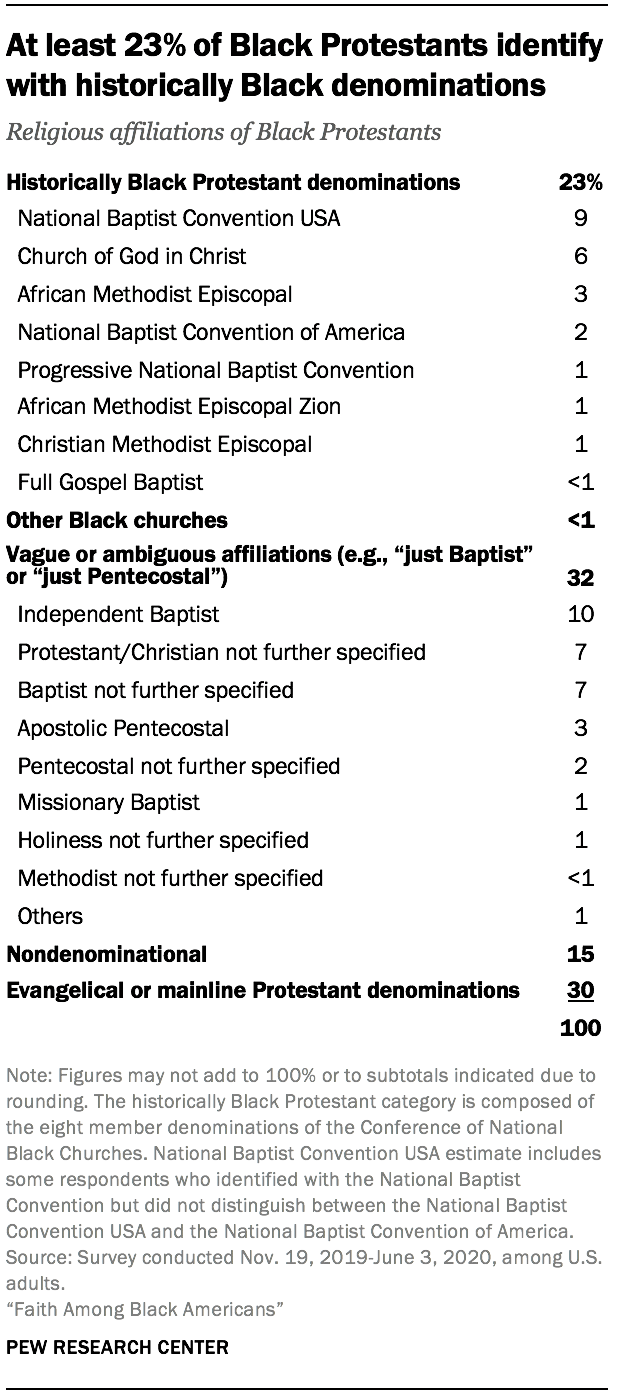 How many Black Protestants identify with one of the nation’s eight historically Black Protestant denominations that make up the Conference of National Black Churches?10 Answering this question definitively is more difficult than it may seem, because not all Protestants identify with a particular denomination. When asked about their religious affiliation, many respondents describe themselves as “just Baptist” or “just Methodist,” for example, without specifying any particular Baptist or Methodist denomination. Still other respondents identify with a congregation (e.g., First Baptist Church), without making clear which denomination their congregation is associated with. Additionally complicating matters, many congregations are not associated with any denomination, and still others are associated with more than one denomination. In Pew Research Center’s 2014 Religious Landscape survey, 38% of all U.S. Protestants described their denominational identity in ambiguous, vague or otherwise difficult to categorize ways.
How many Black Protestants identify with one of the nation’s eight historically Black Protestant denominations that make up the Conference of National Black Churches?10 Answering this question definitively is more difficult than it may seem, because not all Protestants identify with a particular denomination. When asked about their religious affiliation, many respondents describe themselves as “just Baptist” or “just Methodist,” for example, without specifying any particular Baptist or Methodist denomination. Still other respondents identify with a congregation (e.g., First Baptist Church), without making clear which denomination their congregation is associated with. Additionally complicating matters, many congregations are not associated with any denomination, and still others are associated with more than one denomination. In Pew Research Center’s 2014 Religious Landscape survey, 38% of all U.S. Protestants described their denominational identity in ambiguous, vague or otherwise difficult to categorize ways.
In the current survey, 23% of Black Protestants identify with one of the eight historically Black Protestant denominations that make up the Conference of National Black Churches. This includes 9% who identify with the National Baptist Convention, USA (or simply with the “National Baptist Convention”), 6% who identify with the Church of God in Christ (COGIC), 3% who identify with the African Methodist Episcopal Church, and 2% who identify with the National Baptist Convention of America. The Progressive National Baptist Convention, African Methodist Episcopal Zion Church, and Christian Methodist Episcopal Church are each the denominational homes for 1% of Black Protestants in the survey; fewer than 1% of Black Protestants surveyed identify as Full Gospel Baptists.
These figures should be interpreted as floors rather than as definitive estimates of the size of these denominations. In other words, at least 23% of Black Protestants identify with historically Black denominations. There are surely additional adherents of these denominations among those respondents who describe their affiliations in different ways. Nearly one-in-three Protestants (32%) answer the questions about denominational affiliation in a vague way or ambiguous way. This includes those who describe themselves as just Baptist without giving any further information (7%) or as just Pentecostal (2%), for example. Some of these respondents may be associated with one of the four historically Black Baptist denominations or with COGIC, even though they did not describe themselves as such when prompted. It also includes those who identify with other Black churches or with churches that are difficult to classify in the absence of clarifying information, including 10% who describe themselves as “independent Baptists” and 1% who identify as “Missionary Baptists,” to provide a couple of prominent examples. And 15% of Black Protestants describe themselves as nondenominational. Many of them surely belong to truly nondenominational churches, but some may simply be unaware of their congregation’s denominational ties, especially if those ties are not emphasized by the congregation’s leaders.
Meanwhile, three-in-ten Black Protestants identify specifically with evangelical or mainline Protestant denominations – that is, ones that are not historically Black.
As children, three-quarters of Black adults attended a religious congregation that was mostly or entirely made up of Black congregants
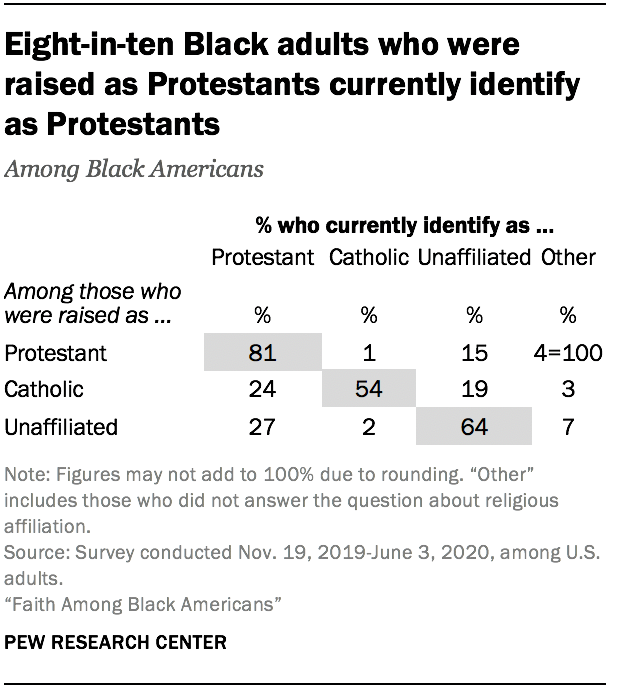 Overall, nearly three-quarters (73%) of Black adults have the same religious identity that they did as a child. Eight-in-ten Black adults who were raised as Protestants currently identify with a Protestant faith today. About half of Black adults who were raised Catholic identify in the same way today (54%); the remainder are mostly Protestant (24%) or religiously unaffiliated (19%).
Overall, nearly three-quarters (73%) of Black adults have the same religious identity that they did as a child. Eight-in-ten Black adults who were raised as Protestants currently identify with a Protestant faith today. About half of Black adults who were raised Catholic identify in the same way today (54%); the remainder are mostly Protestant (24%) or religiously unaffiliated (19%).
Meanwhile, among Black adults who were raised without a religious affiliation, roughly two-thirds (64%) remain religiously unaffiliated today, while 27% have become Protestants.
The Protestant retention rate among Black Americans (81%) is higher than it is for Protestants in the general public: Among U.S. adults overall who were raised as Protestants, 70% currently identify as Protestants. By contrast, Black Americans who were raised Catholic are somewhat less likely than Americans overall who were raised Catholic to remain Catholic as adults (54% vs. 61%).
 A large majority (76%) of Black adults say they grew up attending religious services at predominantly Black congregations, while much smaller shares attended primarily White congregations (7%), congregations with no racial or ethnic majority (7%), or congregations where some other race or ethnicity made up the majority (3%). Only 5% of Black adults say they did not attend religious services at all growing up.11
A large majority (76%) of Black adults say they grew up attending religious services at predominantly Black congregations, while much smaller shares attended primarily White congregations (7%), congregations with no racial or ethnic majority (7%), or congregations where some other race or ethnicity made up the majority (3%). Only 5% of Black adults say they did not attend religious services at all growing up.11
Adults who identify racially only as Black and do not also identify with another race or as Hispanic are much more likely (80%) than multiracial Black adults (39%) or those who identify as Black and Hispanic (25%) to say their childhood congregation had mostly Black attendees. Roughly a quarter of Americans who identify as both Black and another race say they attended a primarily White church as a child (27%), and another 15% say they attended a congregation with no racial or ethnic majority. Among Black Hispanics, 33% attended a predominantly Hispanic congregation as a child.
Older Black adults are more likely than their younger counterparts to have attended a congregation as a child where most attendees were Black. And Black Americans who ascribe a higher level of importance to their racial identity are more likely than others to say they attended that type of congregation growing up.
Racial makeup of congregations linked to distinctive experiences
Black Christians report hearing different types of sermons depending on the type of church where they attend religious services.
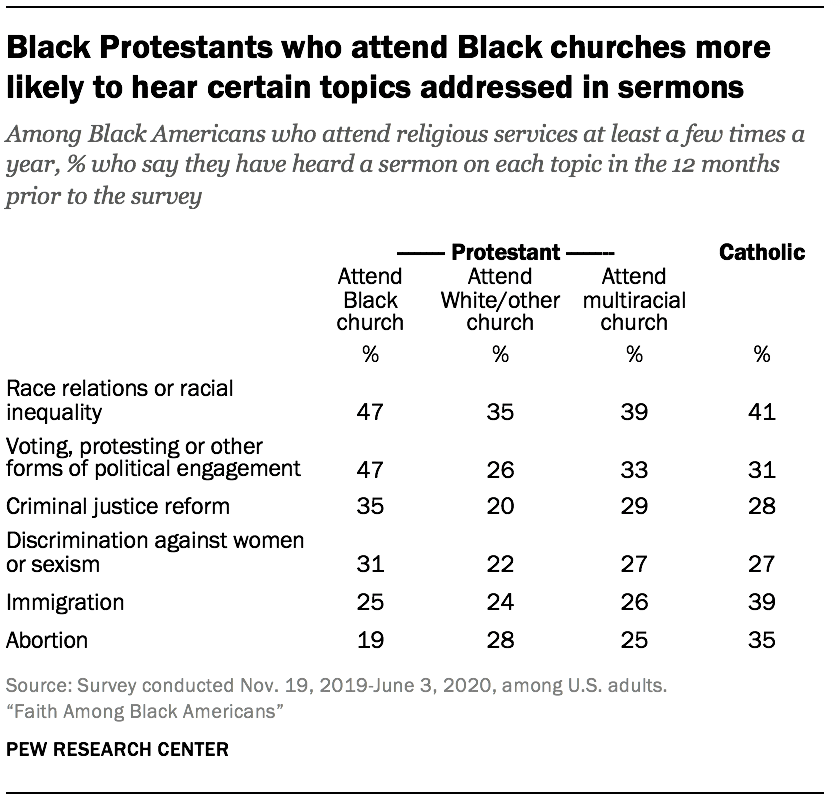 Nearly half of Black Protestants who attend Black churches say they heard a sermon about race relations or racial inequality (47%) in the 12 months prior to the survey. An identical share say they heard sermons about voting, protesting or other forms of political engagement. And about a third say they heard sermons about criminal justice reform (35%).
Nearly half of Black Protestants who attend Black churches say they heard a sermon about race relations or racial inequality (47%) in the 12 months prior to the survey. An identical share say they heard sermons about voting, protesting or other forms of political engagement. And about a third say they heard sermons about criminal justice reform (35%).
Black Protestants who attend Black churches are more likely than Protestants who go to other types of churches to report hearing sermons about each of these three topics. At the same time, they are no more likely to say they have heard sermons about immigration, and they are less likely to have heard sermons about abortion.
Churchgoing Black Catholics, meanwhile, are more likely than Protestants (regardless of what kind of church they attend) to hear sermons about immigration (39% vs. 25%) and abortion (35% vs. 21%).
Not only is the content of sermons different, but the style of religious services also varies substantially across congregations.
The overwhelming majority of Black Protestant churchgoers (94%) say their services include people calling out “amen” or other expressions of approval (sometimes referred to as call and response) at least sometimes. This experience at religious services is virtually universal for those who attend predominantly Black churches (99%) and very common among those who attend multiracial churches (91%). Protestants who go to a church that is mostly White or another race (81%) and churchgoing Black Catholics (66%) are less likely to say their religious services include this practice, and most members of other Christian faiths say this rarely or never happens in their congregations.
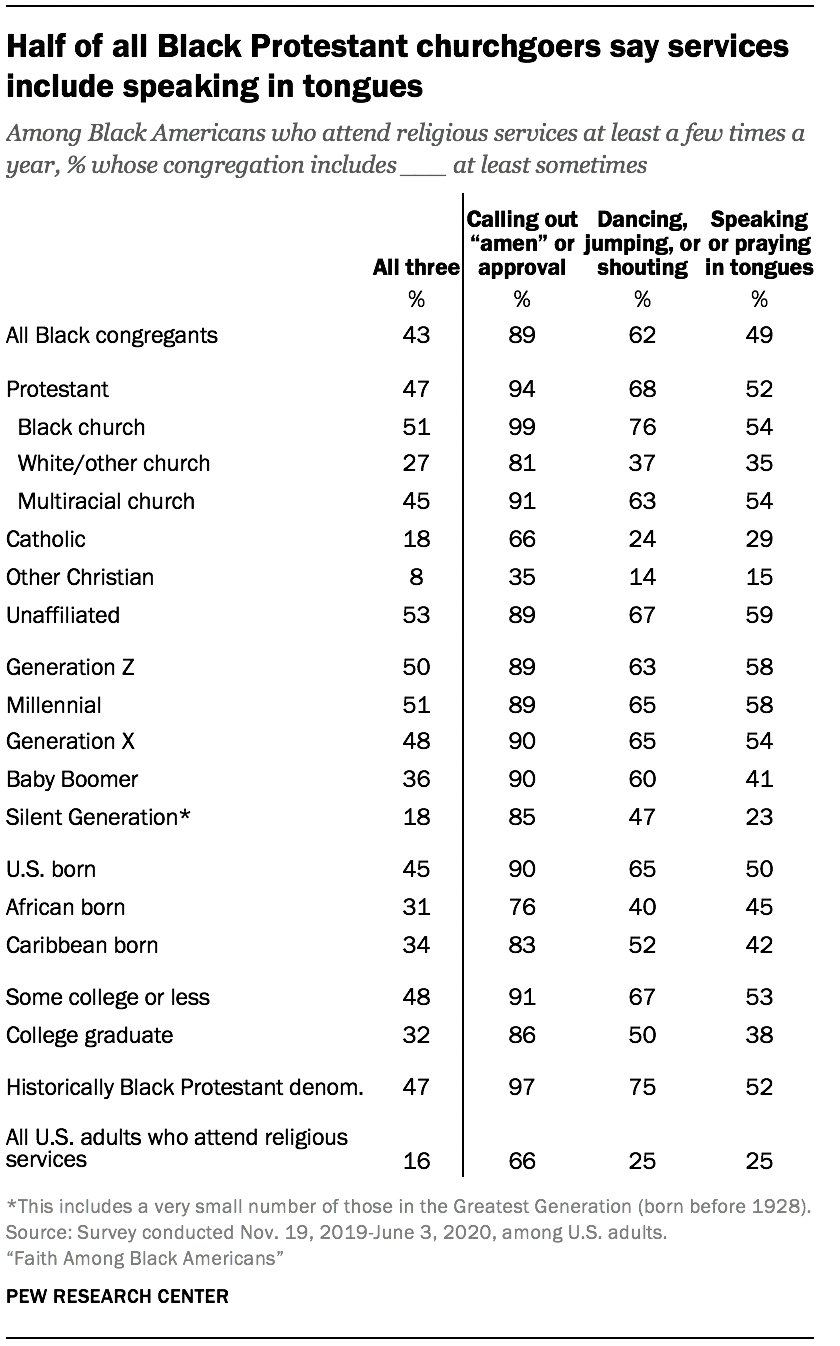 Two-thirds of Black Protestants who attend religious services say that they see adults dancing, jumping or shouting spontaneously during the service at least sometimes. This is much less common among Black Catholics (24%) or other Christians (14%). Again, among Protestants, those who go to Black churches are more likely to say this sort of spontaneous physical expression happens at least sometimes (76%), while most Black Protestants in White or other race churches say dancing, jumping or shouting are rarely or never present in their congregations. These practices are much less common in the congregations attended by African immigrants than in those attended by U.S.-born Black Americans.
Two-thirds of Black Protestants who attend religious services say that they see adults dancing, jumping or shouting spontaneously during the service at least sometimes. This is much less common among Black Catholics (24%) or other Christians (14%). Again, among Protestants, those who go to Black churches are more likely to say this sort of spontaneous physical expression happens at least sometimes (76%), while most Black Protestants in White or other race churches say dancing, jumping or shouting are rarely or never present in their congregations. These practices are much less common in the congregations attended by African immigrants than in those attended by U.S.-born Black Americans.
 Speaking or praying in tongues – also known as glossolalia – is less common than the other practices asked about for Black Americans who attend religious services. But, like the others, it is more often found in Protestant than Catholic congregations. This practice also is most common in the congregations attended by young people: Among Black adults who attend religious services at least a few times a year, more of those in Generation Z (58%) and the Millennial generation (58%) say that their religious services include speaking in tongues, compared with fewer Baby Boomers (41%) and adults in the oldest cohorts (23% of those in the Silent Generation and older) who say this.
Speaking or praying in tongues – also known as glossolalia – is less common than the other practices asked about for Black Americans who attend religious services. But, like the others, it is more often found in Protestant than Catholic congregations. This practice also is most common in the congregations attended by young people: Among Black adults who attend religious services at least a few times a year, more of those in Generation Z (58%) and the Millennial generation (58%) say that their religious services include speaking in tongues, compared with fewer Baby Boomers (41%) and adults in the oldest cohorts (23% of those in the Silent Generation and older) who say this.
The pattern among Black Americans who identify with one of the eight historically Black Protestant denominations in the Conferences of National Black Churches is much the same as that seen in the broader group of Black Protestants who go to a Black church: Nearly all say their services sometimes include “call and response,” three-quarters say that they see adults dancing, jumping or shouting spontaneously, and about half say speaking in tongues happens at least sometimes. In the larger U.S. public, each of these three practices is less common. While two-thirds of U.S. religious congregants overall say they sometimes see people calling out “amen” or other expressions of approval in services (66%), just a quarter say the same about jumping and shouting or speaking in tongues. And just 16% say the services they attend most often include all three of these practices, compared with 43% among Black congregants who say this.
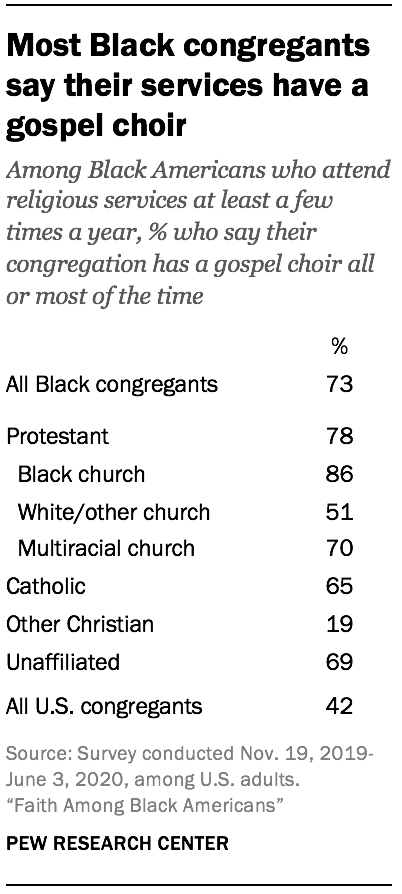 The vast majority of Black Americans who attend religious services at least a few times a year also say that their congregation includes music or musical instruments all (73%) or most (14%) of the time. Far fewer Black congregants say they attend religious services that only sometimes include music (7%) or that they rarely or never do (6%).
The vast majority of Black Americans who attend religious services at least a few times a year also say that their congregation includes music or musical instruments all (73%) or most (14%) of the time. Far fewer Black congregants say they attend religious services that only sometimes include music (7%) or that they rarely or never do (6%).
Catholics are just slightly less likely than Protestants to say their services have music. Other Black Christians are considerably less likely to say this about their services (55%).
The survey also included a question asking Black Americans who attend religious services at least a few times a year how often their services include a gospel choir. As with music more broadly, most Black congregants say this happens all (59%) or most (15%) of the time. Far fewer say they attend religious services that only sometimes (10%), rarely (4%) or never (11%) include a gospel choir. Though the survey asked specifically about a gospel choir, it is possible that at least some respondents understood the question in broader terms – for example, as any kind of Christian choir.
Most Black Americans value being in a welcoming congregation over denominational affiliation, race of other attendees
When asked what sorts of characteristics they would value if they found themselves looking for a new congregation, large majorities of Black Americans say they would prioritize finding a congregation with a welcoming atmosphere and inspiring sermons. Eight-in-ten say that if they were looking for a new house of worship, finding a welcoming congregation would be a “very important” factor in their choice, and a similar share (77%) say the same about finding a congregation with inspiring sermons.
Far fewer Black Americans say the congregation’s denominational affiliation would factor prominently in their choice. Just three-in-ten (30%) say finding a house of worship that belongs to their denomination would be a “very important” factor in their choice; 31% of Black Americans say finding a congregation associated with their denomination would be “somewhat important” in making their decision, while 36% say this would be “not too important” or “not at all important” to them.
Still lower shares say it would be “very important” to find a congregation where senior leaders share their race or ethnicity (14%) or where most other members share their race or ethnicity (13%). Indeed, most Black Americans say that the race of the senior religious leaders and the other congregants would be of little consequence in deciding on a new congregation. More than six-in-ten (63%) say it would be “not too important” or “not at all important” to find a house of worship where the senior leaders share their race, and an identical share (63%) say the same about finding a congregation where most other members share their race.
There are a few differences across social and demographic subgroups of Black Americans on these questions. Black women, for example, are somewhat more likely than Black men to attach a lot of importance to a welcoming atmosphere and inspiring sermons. However, the overall pattern of responses is the same across all subgroups analyzed in the survey; there are far more people in every group who value welcoming congregations and inspiring sermons than who prioritize a congregation’s denominational affiliation or racial composition.
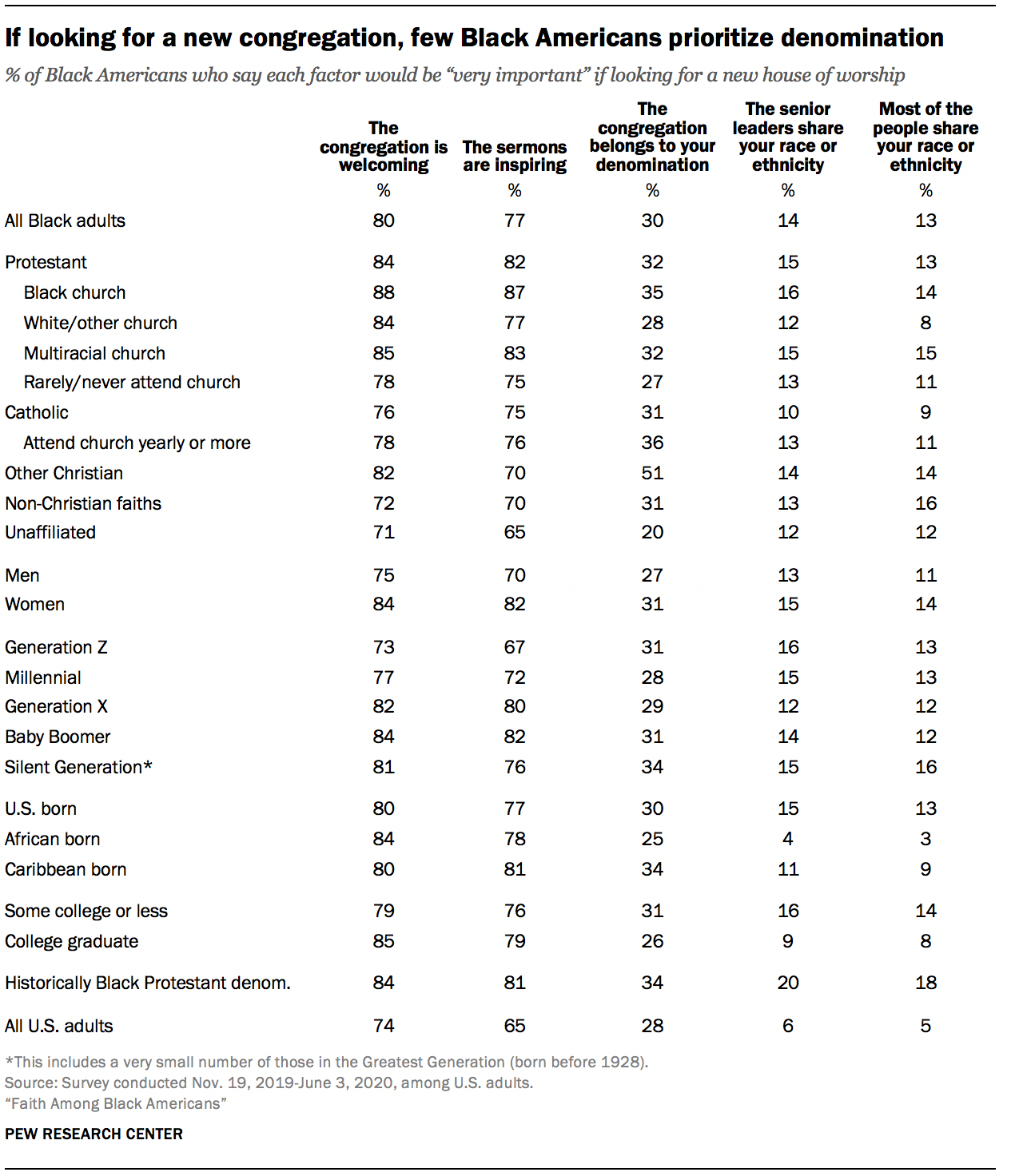
Black Protestant attenders, on average, go to longer services with smaller congregations
On average, Protestants who go to Black churches travel a bit farther than those who go to churches with congregants and leaders who are primarily White or another race. And when they get there, they stay longer.
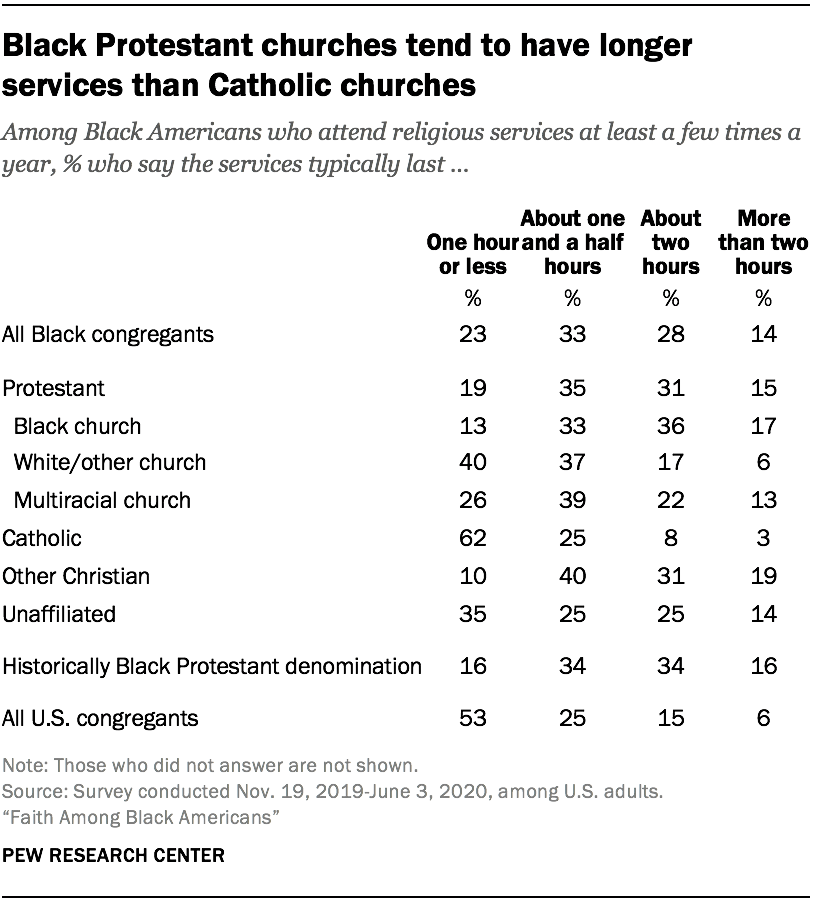 Among Black adults who say they go to religious services a few times a year or more often, 23% say the services they typically attend last one hour or less – well below the 53% of U.S. congregants overall whose services are as brief. Most Black attenders say their services are roughly an hour and a half (33%) or two hours (28%), while an additional 14% say the services they attend most frequently last more than two hours.
Among Black adults who say they go to religious services a few times a year or more often, 23% say the services they typically attend last one hour or less – well below the 53% of U.S. congregants overall whose services are as brief. Most Black attenders say their services are roughly an hour and a half (33%) or two hours (28%), while an additional 14% say the services they attend most frequently last more than two hours.
Black adults who regularly attend Catholic churches tend to have shorter services than those in Protestant churches. Fully six-in-ten Black Catholics (62%) say the Mass they normally attend lasts an hour or less, versus 19% of Protestants who say the same about their services. And among Protestants, those who attend a congregation that is mostly or entirely Black tend to report longer services: About half of Black Protestants who attend Black churches (53%) say their services typically last two hours or more, compared with just 23% of those in White or other race congregations who say this.
While most religiously unaffiliated Black Americans seldom or never attend religious services, those who do tend to go to shorter services than Black adults overall. About one-third of unaffiliated Black adults who attend religious services (35%) say their services last one hour or less, compared with 23% of all Black Americans who attend religious services.
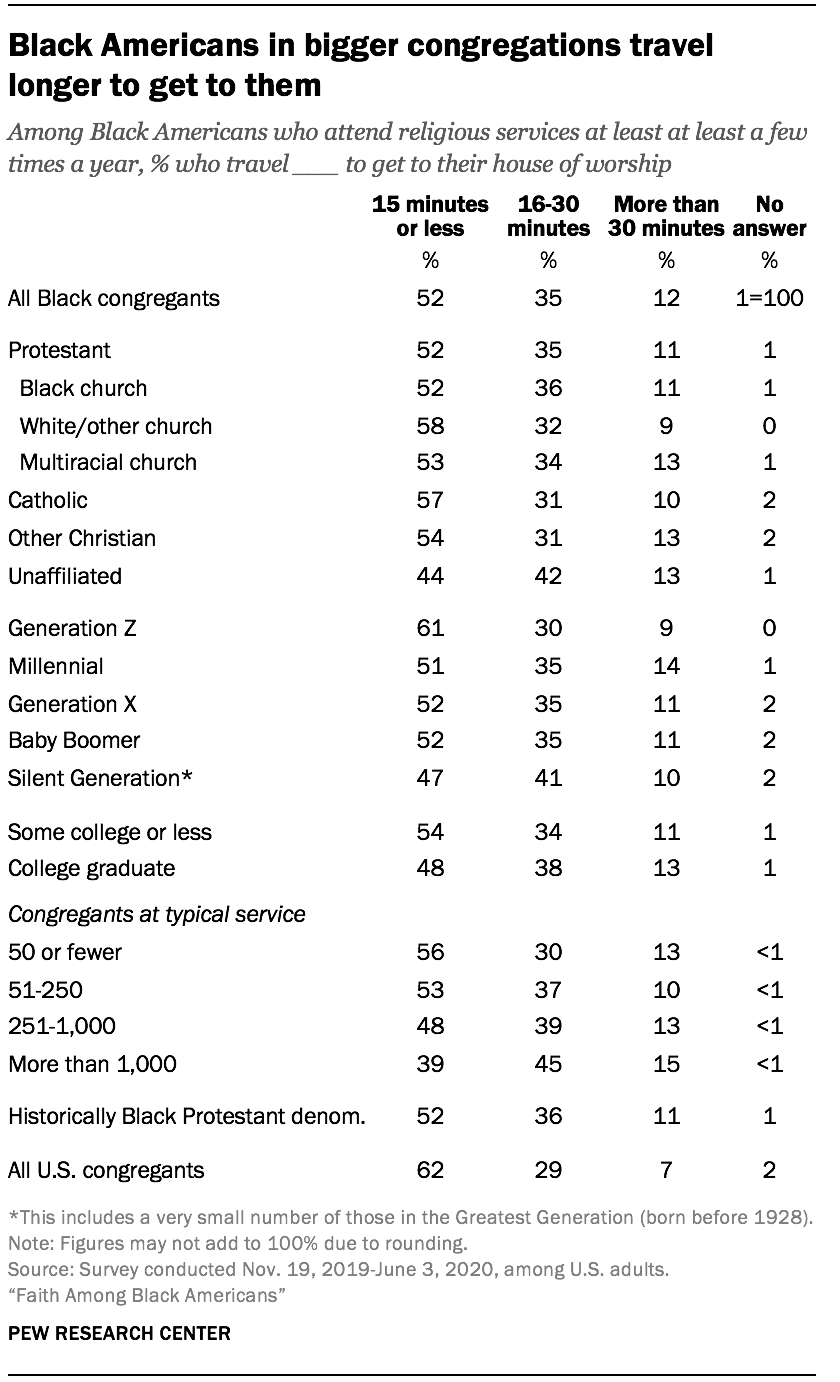 About half of Black attenders (52%) say their congregations are relatively close to home (a 15-minute trip or less). About a third spend between 16 and 30 minutes in transit to get to their house of worship, and 12% take more than half an hour getting to services.
About half of Black attenders (52%) say their congregations are relatively close to home (a 15-minute trip or less). About a third spend between 16 and 30 minutes in transit to get to their house of worship, and 12% take more than half an hour getting to services.
Black attenders, on average, report spending more time traveling to religious services than do U.S. congregants overall, most of whom take 15 minutes or less to get there (62%).
Those who typically go to services with 1,000 people or fewer in attendance tend to live closer to their houses of worship than members of very large congregations. Half or more of Black adults who go to services at congregations of these relatively smaller sizes travel about 15 minutes or less to get there, compared with 39% of those who attend services with more than 1,000 people in attendance.
The survey finds that relatively few Black Americans attend very large churches, and that Black congregants are somewhat more inclined than U.S. religious attenders overall to worship in smaller groups.12
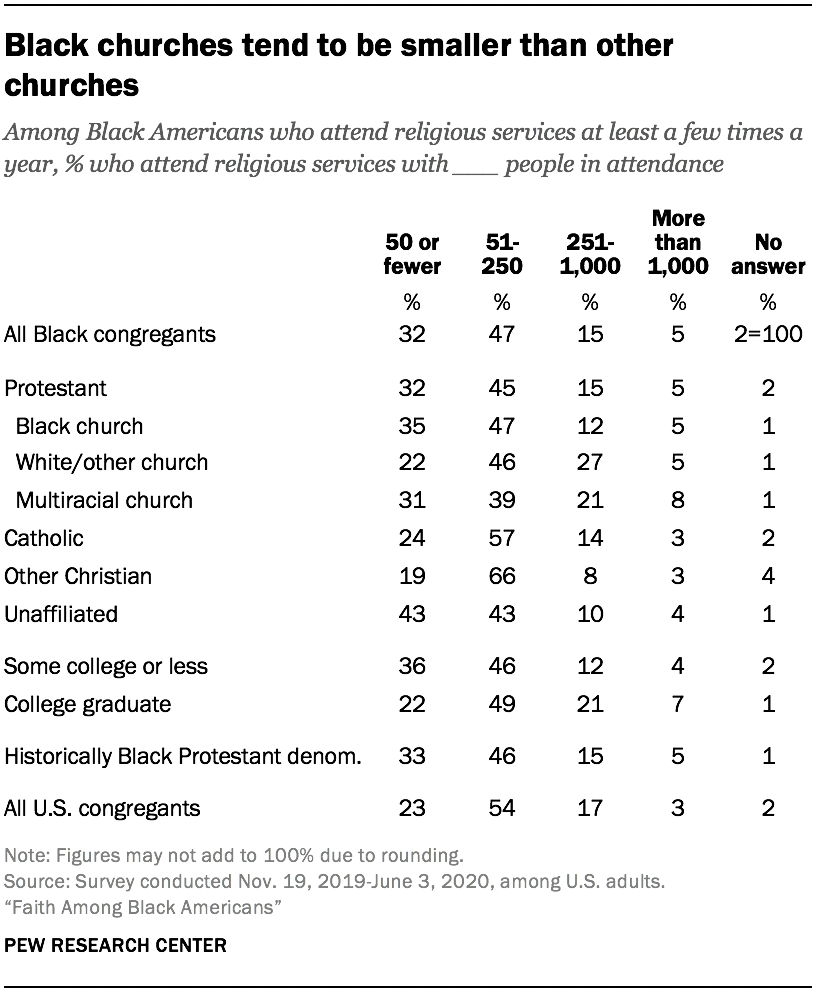 Indeed, about a third of Black attenders (32%) say the religious service they typically attend has 50 or fewer people in attendance (compared with 23% who say this in the general public). An additional 47% of Black congregants say there are between 51 and 250 people in attendance – the most common response. Fewer (15%) say the service they usually attend has between 251 and 1,000 people there, and just 5% say more than 1,000 people attend their service.13
Indeed, about a third of Black attenders (32%) say the religious service they typically attend has 50 or fewer people in attendance (compared with 23% who say this in the general public). An additional 47% of Black congregants say there are between 51 and 250 people in attendance – the most common response. Fewer (15%) say the service they usually attend has between 251 and 1,000 people there, and just 5% say more than 1,000 people attend their service.13
Black Protestants are more likely than Catholics to attend small churches: One-third of Protestants say that 50 people or fewer go to the services they normally attend, compared with one-quarter of Catholics who say the same. And among Protestants, those who attend Black churches tend to report smaller congregations than those who go to White or other race churches. About one-in-five religiously unaffiliated Black Americans attend religious services a few times a year; those who do are more likely than Black congregants overall to go to a congregation with 50 or fewer people.
On all of these questions the pattern among Black Americans who identify with one of the major historically Black Protestant denominations is much the same as that seen in the broader group of Black Protestants who go to Black churches.


